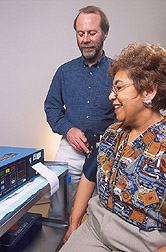Why Are Dieters
|
|
|
|
If you're dieting and your leptin levels go down, you may get a lot hungrier. So say ARS researchers in Davis, California, who are studying the effects of this hormone.
Their investigation at the ARS Western Human Nutrition Research Center is among the first long-term analyses of blood (plasma) leptin levels in women who are on a weight-loss regimen. ARS chemist Nancy L. Keim led the study. Keim hopes that the leptin findings will "help obesity researchers and others who are trying to determine whether leptin can be used effectively to help people shed body fat." Overweight and obesity are pervasive and costly health problems in the United States. Finding ways to help prevent this overnutrition is a priority research topic at the Davis research lab. Nearly one-fourth of all Americans age 20 or older are obese, meaning that they are 30 or more pounds over their ideal weight. Obesity is linked to 5 of the 10 leading causes of death. Nationwide costs of obesity are estimated at nearly $100 billion. |
|
|
Less Leptin, More Hunger
Twelve overweight but otherwise healthy women, age 20 to 40, volunteered for Keim's 15-week study. For the first 3 weeks, the volunteers ate a stabilization diet, which determined how many calories they could consume every day without either gaining or losing weight. For the remaining 12 weeks, the women went on a low-fat, weight-loss regimen. Each volunteer ate 500 fewer calories per day than she would have needed to maintain her starting weight. Calories derived from fat never exceeded 22 percent of each day's total calories. The weight-loss phase of the study also included a program of moderate exercise—walking, weight training, and working out on an exercise bike or treadmill. Meals prepared for the volunteers by the center's dietary staff featured tasty, familiar fare. For breakfast there were foods such as orange juice, canned peaches, pancakes and maple syrup; lunch might be a ham sandwich with jack cheese on french bread, vegetable soup, and gingersnap cookies; and at dinner there would be something like nonfat milk, steak with gravy, mashed potatoes, broccoli florets, and canned pineapple. That day's menus also included an evening snack of orange sherbet and graham crackers. Keim found that during the first week of the weight-loss stint, volunteers' plasma leptin levels dropped by an average of 54 percent. Levels remained low throughout the rest of the study. What's more, the incidence of hunger—and the desire to eat—doubled in response to the reducing diet. Says Keim, "The volunteers who reported the greatest increase in hunger and desire to eat—and biggest prospective estimates of how much they'd like to eat at the next meal—were those with the largest drop in leptin." Volunteers Evaluate Their Hunger Once every 2 weeks, volunteers ranked their hunger by filling out a one-page questionnaire several times during the day. Below each question was a short horizontal line that served as a scale. To answer the question, "How hungry do you feel right now?" volunteers put a small vertical tick mark toward the left end of the scale if they were "not at all hungry" or toward the far right if they were "extremely hungry." "This scale is subjective, of course," Keim admits, "but it's really the only way we have right now to assess appetite." To get a better idea of how to use the questionnaire and estimate their hunger, volunteers began working with the form during the stabilization-diet portion of the study. Volunteers with higher leptin concentrations and smaller decreases in leptin were less hungry while on the reducing diet. Decreases in body weight and body fat didn't seem to play a role in the degree of hunger that the volunteers reported. Keim collaborated in the study with Peter J. Havel and Judith S. Stern of the Department of Nutrition at the University of California at Davis. The work was funded by ARS, the National Institutes of Health, and the Juvenile Diabetes Foundation, International. The research is of interest to the diabetes foundation because new information about the relationships among leptin, insulin, and obesity may lead to better ways to prevent or treat diabetes. The scientists published their findings in theAmerican Journal of Clinical Nutrition. Fructose, Glucose Scrutinized Now Keim, Havel, and Craig H. Warden, a genetics and pediatrics researcher at U.C. Davis, are collaborating in another leptin investigation. The study should help reveal how two kinds of sugars in our foods—glucose and fructose—affect the body's production of leptin and insulin. "When we eat or drink foods with glucose in them," explains Havel, "the glucose triggers release of leptin and insulin. Both of those hormones help regulate our appetite. However, when we eat or drink foods with fructose in them—like soft drinks or some juice beverages—our bodies may produce less leptin or insulin. As a result, we may still feel hungry after eating. It's as if the fructose-containing foods are invisible to our bodies, so our appetites aren't adjusted after eating them." In the new study, Havel hopes to determine whether fructose is indeed "unrecognized by our central nervous system." Keim wants to find out if leptin helps boost metabolism, the rate at which we burn calories. That happened in tests—done elsewhere—on laboratory animals. Animals deficient in leptin burned more calories when they were given additional leptin. And a study of leptin levels in young children showed that those with higher leptin levels apparently burned more calories when they were active. Craig Warden will look for the effects of fructose on the activity of two genes, UCP2 and UCP3. Both genes are thought to control how much energy we expend, and thus, how many calories we burn.—By Marcia Wood, Agricultural Research Service Information Staff. This research is part of Human Nutrition, an ARS National Program (#107) described on the World Wide Web at http://www.nps.ars.usda.gov. Nancy L. Keim is with the USDA-ARS Western Human Nutrition Research Center, One Shields Ave., Davis, CA 95616; phone (530) 752-4163, fax (530) 754-4376. |
|
"Why Are Dieters So Hungry?" was published in the August 2001 issue of Agricultural Research magazine. |
|








